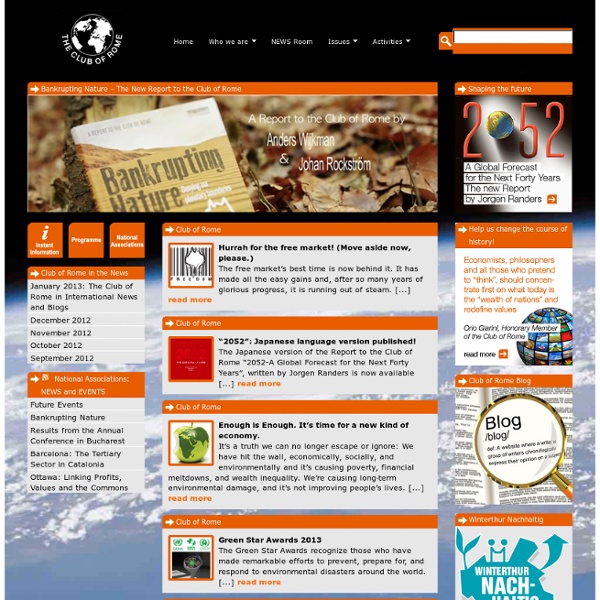THE CLUB OF ROME
Club of Rome “How the Quest for Mineral Wealth Is Plundering the Planet” – Find out more about the 33rd Report to the Club of Rome, to be released in English on 12th June 2014! [...] Shale Gas Fracking – Bubble, Scare or Solution? Hydraulic fracturing – or “fracking” – of shale gas is a highly controversial contemporary topic in politics, society and business alike. A New Story for a New Economy Economists debate whether the economy is recovering from the financial crash of 2008. Why Empires Fall Empires seem to be a typical human structure that reappears over and over in history. Direct Democracy for Climate Protection in Switzerland The Club of Rome is organizing partner of the “Klimalandsgemeinde 2014″, a project based on the traditional Swiss direct democracy approach, granting 10.000 Swiss Francs for the implementation of local climate protection initiatives. [...] Club of Rome Member Ashok Khosla honoured with Zayed International Prize Acting on climate change
Related: Education for Sustainability for Pupils Aged 9 - 13
Principles of Sustainability
The earth is a naturally sustainable system. However, the accumulated impacts of human activity threaten our continued well-being. Research by an international network o f scientists defined three basic conditions that must be met to maintain the essential natural resources, structures and functions that sustain human society. While written to be clear scientifically, the specific wording of the four system conditions can be confusing. The problem is not that we mine and use heavy metals, or use chemicals and compounds produced by society, or disrupt natural processes, or even temporarily interfere with people’s capacity to meet their basic needs.
Education for Sustainability | Sustainable Schools Project
Educating for Sustainability is “learning that links knowledge, inquiry, and action to help students build a healthy future for their communities and the planet.” EFS helps teachers bridge grade levels and subject areas, curriculum and school operations, parent and community partnerships. Through SSP, a school develops its own meaningful, coherent approach to improve curriculum, community partnerships and campus ecology. Teachers learn about the community’s vision and strategies for a sustainable future, then bring this larger dialogue into their curriculum with a focus that’s appropriate for their students. With each lesson learned, students develop their own understanding of the web of connections that make up their community and their role in it. Read the US Partnership's White Paper on Education for Sustainability.
Education for Sustainable Development
Abstract This article can be read as a stand alone piece but it is the intention of ATSE to eventually have clear links to ESD in many of the articles we produce. Here, however, we focus especially on some of the current thinking about ESD in ITE within Science. Our hope is that this article will attempt to stimulate thinking and provide ideas that we hope will act as a spur to enable colleagues to extract and use some of the materials with their science student teachers so that ESD becomes embedded within all ITE Science Education programmes across the country. This article contains:Ideas for Exemplar ITE Module Outlines which focus on ESD including :1.An ESD Elective module with a science element available to all trainees - Here you are provided with a full outline of an elective module undertaken in the fourth and final year of a BA Primary Honours programme available to all trainees following this programme some of which included science specaialists. 1.0 Rationale 2.1 Introduction 2.
loving plants to sustain the Earth
Objectives -
CHILDREN'S RESOURCELESS FUTURE by lore popa on Prezi
info 1
info 3
Related:



